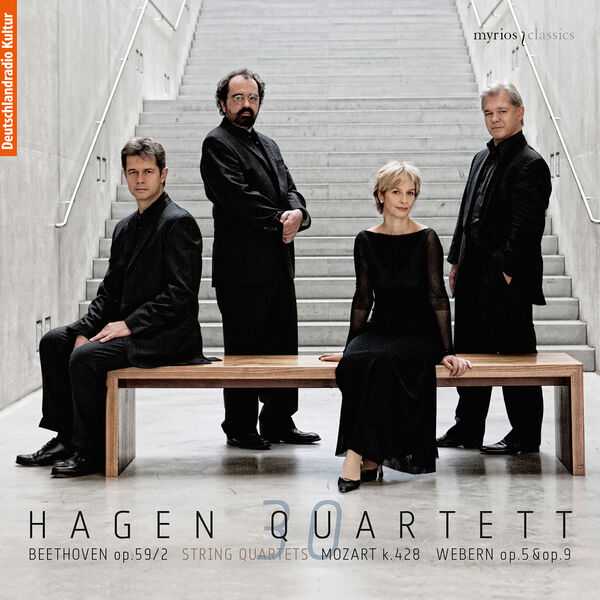

Composer: Ludwig van Beethoven, Wolfgang Amadeus Mozart, Anton Webern
Performer: Hagen Quartett
Format: FLAC (tracks)
Label: Myrios Classics
Catalogue: MYR006
Release: 2011
Size: 3.43 GB
Recovery: +3%
Scan: yes
Beethoven: String Quartet No. 8 in E Minor, Op. 59 No. 2 “Rasumovsky”1
01. I. Allegro
02. II. Molto Adagio. Si tratta questo pezzo con molto di sentimento
03. III. Allegretto
04. IV. Finale (Presto)
Mozart: String Quartet No. 16 in E-Flat Major, K. 428 (421b)
05. I. Allegro non troppo
06. II. Andante con moto
07. III. Menuetto
08. IV. Allegro vivace
Webern: Fünf Sätze für Streichquartett, Op. 5
09. I. Heftig bewegt
10. II. Sehr langsam
11. III. Sehr bewegt
12. IV. Sehr langsam
13. V. In zarter Bewegung
Webern: Sechs Bagatellen für Streichquartett, Op. 9
14. I. Mäßig
15. II. Leicht bewegt
16. III. Ziemlich fließend
17. IV. Sehr langsam
18. V. Äußerst langsam
19. VI. Fließend
The program looks like what was conventional in the 1970s and 1980s: Beethoven, Mozart, and the obligatory entry from the early 20th century, in this case Webern. But what you get from Germany’s Hagen Quartet, here celebrating its 30th anniversary, is anything but conventional. The group members state that their aim is “to illustrate such things as pauses, fermati, dissonances, and certain extreme emotional phenomena as vividly as possible.” Indeed, this is a set of hyper-expressive performances. For an example, look no further than the finale of Mozart’s String Quartet in E flat major, K. 428, where the quartet blows through the rhythmic regularity of the opening phrases on the way to a total roller coaster ride of unexpected phrasing and constantly shifting treatments of the piece’s already humorous and often intentionally deceptive pattern of silences and consequent-antecedent pairs. The extraordinarily un-dancelike minuet is likewise on the far edges of an ordinary conception of the work. The intense Beethoven String Quartet in E minor, Op. 59/2, is paradoxically not quite so extreme, but the beautifully reverent Molto Adagio movement is one of the highlights of the disc. The nicely matched pair of early atonal (and not twelve-tone) Webern works for quartet makes a perfect conclusion, with the tension of the extreme contrasts of the Five Movements for String Quartet, Op. 5, seeming to explode into the little bits that constitute the Bagatelles for string quartet, Op. 9, pieces just a minute or so long. Your mileage certainly may vary with this often idiosyncratic disc, but the Myrios label’s super audio sound is superb, and one thing’s for sure: it’s never boring.
![Cédric Tiberghien - Variation[s] vol.1 (24/192 FLAC)](https://boxset.me/wp-content/uploads/2024/06/tiberghien-beethoven-complete-variations-for-piano-01-24192-150x150.jpg)


